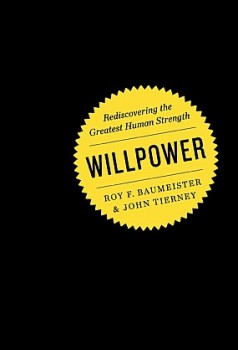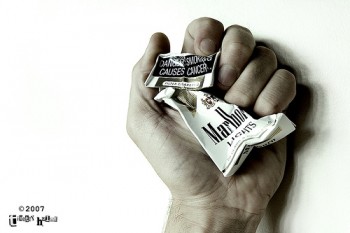This article is also published on Positive Psychology News Daily.
The American Psychological Association recently commissioned some research on stress and willpower in America to understand American perceptions of stress and the motivation to make lifestyle and behavior changes. Almost everyone that they surveyed (93%) had goals to change some aspect of their behavior in 2012. And “lack of willpower” is the top reason people give for falling short of their goals.
As you might expect, most of the goals people set are around improving health. In the last 5 years almost everyone has set one or more health goals including to eat better (77%), exercise more (75%), lose weight (66%), reduce stress (60%) or get more sleep (58%).
In spite of all of these noble goals, the APA’s research suggests that less than half of adults who recognize a needed change in their lifestyle are able to maintain the change. There is good news for those wanting to cut back on alcohol, as this is the exception. Quitting smoking and reducing stress seem to be the two hardest lifestyle factors to modify.
Why is change so difficult? The #1 barrier to change that the Americans in the survey cited was a lack of willpower (27%.) But it is interesting to note that not having enough time is growing year over year as a perceived barrier (up to 26% in 2011 from 22% in 2010 and 20% in 2009). And time and willpower seem to be related since time was the number one thing respondents felt could help them to be more disciplined about behavior change. This makes sense since reducing time pressure does seem to be better for health.
But if willpower is the biggest barrier to overcome, this is good news, since scientists (Roy Baumeister, among others) have shown that willpower can be developed with exercise (“like a muscle” Baumeister would say.) About 71% of the adults surveyed believed that willpower can be learned so most people are not constrained by their own self limiting beliefs.
So what’s missing? Why isn’t change easier? The answer seems to be motivation.
The participants who reported the highest levels of motivation were significantly more likely to be successful. It should be noted that participants reported that all or most of their motivation comes from within. Only 12% had the motivation of a family member, friend or health care provider as the driving force.
Those with high motivation were also more likely to pursue certain success strategies that most people find challenging such as resisting temptation, and postponing short-term desires in exchange for better long-term outcomes.
Clearly, building motivation is an important part of behavior change and could be an aspect that people sometimes overlook. One exercise that people can use to build their motivation is called “Wanting What You Want to Want” (WWYWTW). Most of the APA survey respondents cited setting clear goals and reminding oneself of the goal when temptation occurs as important strategies to follow. Setting a clear goal is about defining “what you want.” But WWYWTW is about defining what you want to want more. What do you want to be motivated more to do?
To do this exercise you analyze what you want to want more. For example, you might say, “I want to want to exercise more.” Then you analyze things that would make you want that more. For example, you might list “if I went with a friend; if I knew I had good music to listen to at the gym; if I had pictures up on my wall of very fit people, etc.”) This exercise can help to identify strategies to boost your motivation and therefore improve your lifestyle.
Since willpower is simply a person’s ability to do what is best in spite of other attractive options it is strongly driven by the level of desire for the better outcome. So next time you are setting goals for yourself, don’t just ask “what do I want?” Ask, “What do I want to want?” and then grow that desire.
—
References and recommended reading:
Baumeister, R. F. & Tierney, J. (2012). Willpower: Rediscovering the Greatest Human Strength. The Penguin Press.
P.S. This week, I am at the Global Spa and Wellness Summit at the Aspen Institute. Tomorrow, I will be speaking on “Spas and the Science of Happiness” on a panel alongside Jessica Alquist, one of Roy Baumeister’s colleagues on willpower research.
by Jeremy McCarthy
Connect with me on facebook, twitter, or pinterest.
Learn more about my online course on positive leadership here.




It is disappointing to see that more and more people say that their biggest obstacle is lack of time. Lack of time really is lack of motivation, but disguised as something that’s outside of our control. It allows the “victim” not to take accountability so they can be comfortable maintaining the status quo. But as long as we, as a society, find it acceptable – or even worse, “cool” because we think that it means the person is successful – to be overwhelmed all the time, then this trend will continue.
For me, succeeding in life doesn’t equate having a successful life, and a successful life begins with health.
MarieJ
Thanks for the post Jeremy. I think that we naturally resist change, yet change is the only constant. I work with people who have been working on a single issue most of their life. I believe that it is paramount to create a compelling goal – why do you genuinely want what you want. Often what we want is masking a different need that needs to be satisfied, otherwise – we just go from one to another desire. Alfred Adler would say that we want safety, belonging and significance and every desire is intended to meet these three intrinsic aspects. These are my recommendations for creating change:
-Accept things as they are and ask what do i want
-What are your true desires if you didn’t pay attention to good opinion of others
-Why is it important
-What will it cost you if you never do it
-When have you accomplished something in the past (speaks to resourcefulness)
-How will you accomplish this
I no longer think it is difficult to create behavior change as long as we have the tools and support. Thanks again!
MarieJ, I hadn’t thought of that perspective on time as an excuse. It’s a good point that focusing on an element over which we have no control allows someone to alleviate responsibility. I do think time is a key factor though. Especially when you consider all of the things we are “supposed” to do: exercise (strength, cardio, stretching), meditation, buy and cook healthy foods, spend time with family, work 60 hours a week to be successful, etc. We are always in the situation of knowing we should do more than we possibly can in the hours that we have.
To yours and Jasna’s point, change in one particular area is not difficult, but given all of the things that people should do to live a good life, we are forced to allocate our willpower and time towards certain goals and let others go by. Time and willpower seem to be related in this sense as they can both be used to create more wellbeing but both are limited resources and so we have to consider how and where we want to use what we have.
Here’s the question, though: if someone was told that they’ll die of a heart attack inside 6 months if they don’t start to exercise, what % do you figure would now suddenly find time to do it? My bet is above 90%. But as long as we’re not sick, we don’t feel the urgency. Doesn’t mean urgency doesn’t exist.
Also, I don’t happen to believe we have to work 60 hours a week to be successful. In fact, working 60 hours a week may limit our ability to be successful. Nobody is as productive and nobody adds as much value to what they do when they are tired, stressed, lethargic and malnourished.
That being said, I don’t entirely disagree that time is a constraint. I just don’t think it’s as prominent as people make it to be. How many say they have no time to exercise, yet they update their status 6 times a day and know all the updates on The Bachelorette, American Idol and Biggest Loser?
MarieJ
MarieJ, all great points! You are so right!
Interesting comment on Gretchen Rubin’s blog suggesting that, while motivation is important . . . more motivation isn’t always better: http://happiness-project.com/happiness_project/2012/06/happy-family-happy-life/
Here’s a quote from Michael Pantalon, author of “Instant Influence”:
“Numerous studies have shown that people having any level of motivation are capable of making dramatic changes. When people have rated their motivation on a scale of 1 to 10, for example, you might think that the 10s would be more likely to take action than the 2s. No so! In fact, several of my own studies found that people who made significant changes in their behavior appeared all along the motivational continuum, not just at the high end.”
I like the Pantalon idea that motivation may not be the primary determinant. Just because people CITE time and willpower as the biggest obstacles doesn’t mean they’re right. I think Jasna’s comment is on the right track, focusing on basic needs underlying our habits and change efforts. Oliver Burkeman’s article (which I also found via Gretchen Rubin’s blog!) helps explain why changing habits requires both time and insight into the underlying needs that helped form and reinforce the original habit we’re trying to change (from an article at http://www.guardian.co.uk/lifeandstyle/2009/oct/10/change-your-life-habit-28-day-rule).
“The subtler problem [with changing habits quickly] is that we tend to think about habit change wrongly. …We get trapped in a paradox: we want to, say, stop watching so much TV, but on the other hand, demonstrably, we also want to watch lots of TV – after all, we keep doing it – so what we really want, it seems, is to stop wanting. We’re mired deep in what the Greeks called “akrasia”: deciding on the best course of action, then doing something else. The way round this, says Newby-Clark and others, is to see that habits are responses to needs. This sounds obvious, but countless efforts at habit change ignore its implications. If you eat badly, you might resolve to start eating well, but if you’re eating burgers and ice-cream to feel comforted, relaxed and happy, trying to replace them with broccoli and carrot juice is like dealing with a leaky bathroom tap by repainting the kitchen. What’s required isn’t a better diet, but an alternative way to feel comforted and relaxed.”
Well said Russel. It seems to me that the key to driving lifestyle change is to keep in mind two contradictory thoughts simultaneously:
1. change is possible.
2. change is hard.
The first one gives you the hope, optimism, and self-efficacy to drive perseverance towards your goal. The second one reminds you to put in the work and avoid the lure of seemingly easy shortcuts that don’t really change long-term habits. Heidi Grant Halvorson (see http://www.heidigranthalvorson.com) suggests “mental contrasting” as an exercise to flip back and forth between the optimistic vision of your goal (which drives hope and motivation) and the realistic obstacles and hurdles that will have to be overcome (to keep you in reality and persevering when the going gets touch.)
Hahahahha,,I love you Over Thinkers..
Without enough Pain, nobody really changes..maybe 3%…
You are only conscious 5% of the day so changing what runs your Life 95% of the time your subconcious which you clearly have no control over means Change is very hard..
Controlling your nerous system? Imposible for most again…so just keep over Thinking about all the Bla Bla Bla ,,reading more books is also a waste of time that you could be spending in practcng Real Change./…
Love Always Wins,,,Fall deeply in love,,that will change you fast of all…